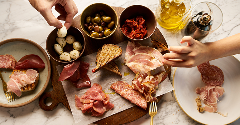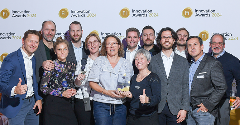News
Mosa Meat finishes its funding round with $96M
3 Mar 2021Dutch foodtech company Mosa Meat raised $10 million in its final Series B funding round, bringing the company’s total funding to $96 million. The company, which produces slaughter-free meat, said it would use this latest cash infusion to increase its production through expanding its facility and production line size as well as increasing the number of staff working toward bringing its cultivated beef to commercialization.
For this most recent funding round, Mosa Meat managed to attract some of the same investors, include Nutreco. Other participants include the CEO of Just Eat Takeaway.com.

In a statement, the Netherlands-based company said, “The closing of Series B funding brings us one step closer to our mission to develop a cleaner, kinder way of making real beef.”
Cruelty-free protein is an in-demand category that is steadily growing in popularity, and cell-based meat is one solution that is working to gain traction with consumers and governments. For years, protein that was cultivated using animal cells has faced three major hurdles: price, consumer acceptance and governmental approval.
Price is one variable that has drastically dropped in recent years. When Mosa Meat created the first ever cell-based hamburger in 2013, it cost about €250,000 due to the fetal bovine serum that was required for cell-based meat. In the last eight years, however, prices have dropped dramatically. In September of 2020, the startup estimated that its burgers cost €9 each, according to data report by Sifted. A large proportion of this cost reduction comes from the startup switching to animal-free sources for fetal bovine serum.
While Mosa Meat has led the way in cell-based meat in many ways, it is not the exclusive competitor in the field. In Israel, there is SuperMeat, Aleph Farms and FutureMeat Technologies. FutureMeat announced recently that it has a cell-based chicken breast that it sells for $7.50 in the U.S. Aleph Farms focuses on beef and made the first ribeye steak using slaughter-free technology.
These advances in technology have naturally been preceded by funding. In the first quarter of 2020, investors put $189 million toward cell-based meat products, according to the Good Food Institute. That figure is over twice the $77 million that these alternative protein companies were given in 2019. But despite consumer enthusiasm, consumers remain hesitant about cell-based alternatives.
A 2019 poll from the marketing firm Charleston|Orwig found that 40% of consumers find lab-grown food to be “scary.” However, Mosa Meat sees that small number of consumers that are confident in cell-based meat to be a promising sign. “Even 20% of the public is an enormous market of first adopters,” the company says on its website. “We are confident that when the product is of high quality and is competitively priced the benefits will appeal widely to consumers.”
Still, regulatory approval remains a hurdle for cell-based meat companies. Mosa Meat is aiming to earn approval in Europe, where the company is based, but it is still going through preliminary processes with the European Food Safety Authority. More broadly, markets like the U.S. are still exploring how to regulate cell-based meat and what the requirements will be to sell the products commercially. On the other hand, there are glimmers of hope. In December, Singapore became the first country to grant regulatory approval to San Francisco-based Eat Just's cultured chicken.
While there is still a long way to go before cultured meat is a mainstream phenomenon, there are clear signs indicating that the adoption of this slaughter-free protein source may become the norm in the future.
Related news

Oat Barista: Innovation for game-changing beverages
20 Nov 2025
Oat Barista is a clean label, sustainable, and innovative drink base specifically designed to create the perfect foam in one single ingredient.
Read more
Nitrites: Pressure grows on UK to follow EU’s lead
20 Nov 2025
Pressure is growing on the UK to follow the EU’s lead after the bloc revised its regulations on the permitted levels of nitrites and nitrates in cured meats.
Read more
Empowering innovation in fortification and colouration
13 Nov 2025
Divi’s Nutraceuticals offers a large portfolio of innovative, high-quality ingredients for foods, beverages, and supplements, with bespoke solutions and expert support for product success.
Read more
Danone highlights digestive health as potential ‘tipping point’ for food industry
13 Nov 2025
Danone is betting on a food industry “tipping point” that will bloat the market for healthy products, particularly those related to gut health.
Read more
Standing Ovation and Bel scale up casein production from dairy co-products
11 Nov 2025
Foodtech company Standing Ovation has partnered with cheese specialist Bel Group to manufacture dairy serums for industrial-scale casein production via precision fermentation.
Read more
AI attraction means foodtech startups must ‘prove’ rather than ‘promise’
4 Nov 2025
Reports suggest that artificial intelligence (AI) is sucking investment from foodtech and agritech, but investors say the picture is complicated.
Read more
Will postbiotics become the go-to functional ingredient?
3 Nov 2025
Postbiotics show significant promise for the functional foods market due to their safety profile and beneficial bioactive properties, research suggests.
Read more
Meet the finalists of the Fi Europe Innovation Awards 2025
31 Oct 2025
Who made it to the shortlist of the Fi Europe Innovation Awards 2025? Read about the 23 companies making food and drink products healthier and manufacturing processes more efficient.
Read more
Penguin and Club bars no longer classed as chocolate
30 Oct 2025
Penguin and Club bars can no longer be classified as chocolate after the pladis-owned McVitie’s brands turned to cheaper alternatives amid the ongoing cocoa crisis.
Read more
Shorter drying time, sweeter success!
30 Oct 2025
Curious about cost-effective, sustainable and delicious candy making? Stefan Wessel reveals how Avebe’s solutions reduce drying time and energy use by up to 50%.
Read more